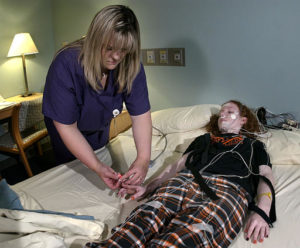By Molly Glus, Journalism 1 / Lynn Dang, Section Editor
With hazy, tired eyes, students shuffle through the crowded halls all wanting one thing: sleep.
That hazy, tired look means students are sleep deprived. At one time or another, Hershey High School students have the desire to sleep. Why? Many students say, whether it is from too much homework, studying, extra curriculars, or even social media, that they do not get enough sleep.
Tara Blackburn, the school nurse, and Ellen Ott, one of the school guidance counselors, were able to give students helpful tips on ways to end their constant need for sleep and to give them ways to help them start enjoying their high school experience a little more.
Sleep deprivation can be caused by a number of things. For high school students, it is a wide range. According to Blackburn, the majority of the time it is the struggle for students to balance school work and extra curricular activities.
“[Students] get so exhausted trying to balance school work and extra curricular activities, it can get to be too much,” said Blackburn.
Based upon an informal survey of 30 students from all grades in Hershey High School, 99 percent of students are involved in at least one extracurricular activity. Additionally 77 percent found that they only get five to eight hours of sleep. Teens are recommended to have eight to ten hours.
Students need to “find a balance,” said guidance counselor Ellen Ott.
Ott added that it really can get to be too much for students; however, if students find a way to balance school and extracurriculars they will find more time in their schedules for sleep.
According to huffingtonpost.com, a website that addresses local and international news, another main cause of sleep deprivation is social media and cell phone use. From data collected in a high school student survey, 50 percent of students were reported to be on their phones one to four hours a day, and 73 percent of students reported being on their phones over 30 minutes right before they go to bed.
Blackburn explained, “There is always a constant temptation with group texts, social media, and more, it does interrupt your sleep.”
A solution? Blackburn and Ott recommend that half an hour before bed, students shut their phones off and plug them in a place that will not be tempting to go retrieve the phone. That way they can catch up on lost sleep.
However, sleep for some does not happen easily. What can help?

Blackburn said a possible aide is melatonin. Melatonin is a natural supplement; it’s main purpose, according to Blackburn, is to adjust the body’s internal clock to help people fall asleep quicker and with less difficulty.
While melatonin speeds up falling asleep for some, there can be side effects for some who try the supplement. According to mayoclinic.org, a website that helps with medical questions and needs, states that it [melatonin] can cause headache, daytime sleepiness, and stomach cramps. It is not recommended for all, but it can benefit those who really need a jump start to begin their night full of sleep.
Blackburn believes there is a fine line regarding the use of melatonin. I think it is helpful, but students have to be careful that they do not take an increased dosage.”
Although some supplements, like melatonin, help people sleep, others, such as caffeine, actually keep people awake. According to healthresearchfunding.org, teenagers consume approximately 100 milligrams of caffeine a day.
According to Ott and Blackburn, even though buying a venti frozen mocha at Starbucks seems like a good idea at the time, there could be harmful effects to one’s sleep. Teens need to make sure they do not have too much of a caffeine intake.
Blackburn said the levels of caffeine each person can tolerate is not the same.
To ensure there isn’t too much caffeine in one’s system at the time to sleep, according to Ott, teens should not have caffeine intake of any kind in the evening. Ott explained, “Stay away from caffeine at night; it results in a harder drop off.
According to Blackburn, because caffeine keeps students awake at night, the caffeine can lead to more stress.
According to a 30 student survey, 50 percent of students find themselves stressed or thinking a lot before bed due to homework, tests, and other important school events. From that, a student’s sleep amounts tend to decrease due to not finding the best ways to deal with stress.
Sleep is one of the best ways to help get rid of stress, according to a study from the American Psychological Association.
On a school night, it is recommended by Ott and Blackburn that on average a student gets 7.4 or more hours of sleep, so they are more prepared to handle the busy school days.
Blackburn explained that on a daily she has students come to her office because they are so exhausted and stressed that they can’t concentrate.
“As a teenager, they have sports, extracurriculars, and relationships all on top of the daily tests and quizzes,” Blackburn said, “Teens need to learn to deal with their stress in a healthy way.”




